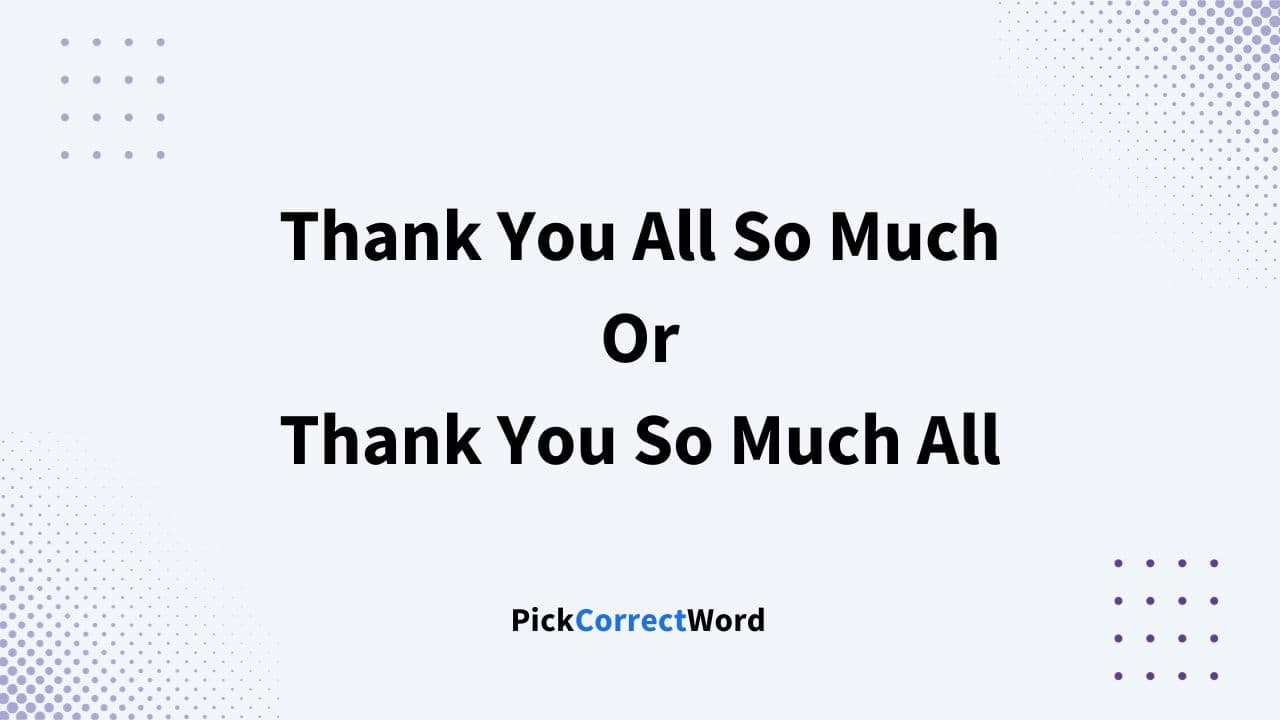It’s common and correct to say “Thank You All So Much” when you want to thank a group of people. It is clever how the word “all” is emphasized in this sentence, making it clear that your thanks are meant for everyone in the group.
Other option, “Thank You So Much All,” is incorrect and is only heard occasionally in everyday speech.
After saying “thank you,” it’s important to make sure the next few words follow correct grammar rules to maintain clarity. To show your sincere gratitude and keep your expression elegant, choose the right phrase. This will make sure that everyone feels appreciated for their contribution.
Thank You All So Much vs. Thank You So Much All
Further we will look at the structure of the phrases “Thank You All So Much” and “Thank You So Much All,” and look at the correct way to use, as per the rules of grammar.
“Thank You All So Much” follows correct grammar by putting the subject, object, and adverbial phrase in the right order. This sentence uses “thank you” as the subject and “all so much” as an adverb to emphasize how grateful the speaker is. The structure of the sentence is correct because “you all” is the direct object which receives the action of thanks.
- Correct: Thank you (subject) all (direct object) so much (adverbial phrase).
In the phrase “Thank You So Much All” these parts are rearranged in a way that is not correct grammar. Usually, the direct object comes right after the verb, so putting “all” at the end of the sentence is not correct English syntax.
Variations
While the favored phrase is “thank you all so much,” you might come across variations in everyday speech. For example, you could say “thank you so much, all” in a casual chat and it would likely be understood as “thank you all,” even though the structure is less formal.
However, it’s crucial for you to understand that these variations shouldn’t replace the grammatically correct form, particularly when you’re writing or in formal situations.
- Informal: Thank you so much, all.
- Formal: Thank you all so much.
The most appropriate way to show appreciation to a group is to say “thank you all so much.” This phrase shows respect and correct English usage.
Correct Usage and Examples
When you’re speaking to a group of people, using “thank you all so much” is the grammatically correct option. This phrase places “you all” as the direct object, showing that your gratitude is aimed at the whole group. In practice, it would look like this:
- After a team effort: “I couldn’t have completed this project without your help, thank you all so much.”
- In recognition of group support: “Your support has been overwhelming, thank you all so much.”
Keep in mind, “thank you” works as a shortened form of “I thank you,” where “thank you” is a set phrase. It’s embedded in the English language that expressions of gratitude are followed by the receiver. So, when you say “thank you all so much,” you’re making sure your appreciation is correctly directed to “you all,” who have contributed to whatever you’re expressing gratitude for.
To wrap it up, when it comes to expressing your thankfulness to a group, it’s important to use the correct language to convey your gratitude effectively. In your acknowledgments, make sure you use the right form to keep things clear and correct.
Frequently Asked Questions
What are some more polite ways to say “thank you” to more than one person?
The phrase “thank you all so much” is generally used as a polite and appropriate way to show appreciation to more than one person. If you want to show your sincere gratitude to a group, you could say “I appreciate everyone’s help” or “I’m grateful to all of you.”
In casual expressions of thanks, is using ‘y’all’ considered proper?
In informal situations, particularly in certain regions like the southern United States, “thank you, y’all” can be an acceptable way to address a group. However, it may not be proper in more formal or professional contexts.
What is an appropriate way to convey sincere thanks formally?
Use phrases like “I extend my heartfelt thanks to all of you” or “Your collective efforts are greatly appreciated” when you’re in a formal setting. In professional or official settings, these are a sincere and kind way to show appreciation.


